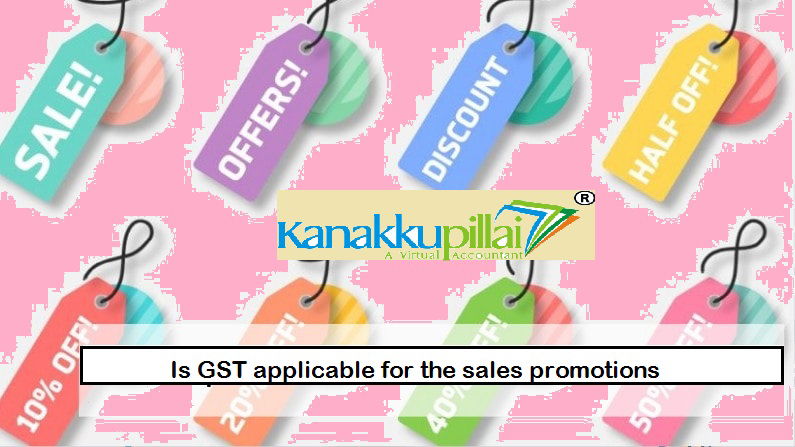Last Updated on August 6, 2025
Sales promotions such as discounts, free samples, cashback offers and gift vouchers are common ways that businesses in the competitive Indian market use to attract customers. Nevertheless, one of the most relevant questions that many business owners and marketing experts ask is whether GST is payable under an Indian sales promotion. The solution may not always be simple, which is based on the nature of the promotion or the structure of the GST law.
This blog clearly elaborates upon the applicability of Goods and Services Tax (GST) in various types of sales promotion that can assist companies to become compliant with the law and allow them to chalk out their market plans effectively.
Understanding Sales Promotion under GST Law
Sales promotions refer to the mechanisms that companies follow to raise the number of goods or services that they sell. These might come in the form of price discounts, buy one get one (BOGO), freebies, coupons, and loyalty points, among others.
Since the introduction of the GST regime in India, all supplies of goods and services, in the course or as furtherance of business, are deemed to be taxable, unless otherwise granted an exemption. Regarding the sales promotions, the GST implications on this kind of promotion depend on the structure of the offer.
GST on Discounts
There are two types of discounts under GST:
1. Pre-Sale Discounts
They are given in advance of sale or when the sale occurs, as stated in the bill. The net amount (after discount) is chargeable to GST. As an example, a product of Rs. 1,000 will be given a discount of Rs. 200; in this case, GST will be charged on Rs. 800.
2. Post-Sale Discounts
This is a discount that comes after the sale, and it is normally on a volume or performance basis. In the case where such a discount is connected to the original invoice and the recipient does a reverse charge in the Input Tax Credit (ITC), GST will not be charged on the discount. GST may apply, though, in case such conditions are not fulfilled.
Companies should also ensure that post-sale discounts have a proper record and consent so as to eliminate disputes with GST authorities.
Buy-One-Get-One-Free Offers
GST treats the BOGO offer as a composite or mixed supply. Although an item is promoted as being free, the two items are considered to be supplied at one price. The overall price is divided among the products and GST is charged respectively.
For example, when you buy one shampoo, you get one conditioner free at 200. The 200 will have a GST of 200, and both products share the value.
In these situations, it is the responsibility of the business to estimate the value of the said free product and charge tax on it as a supply.
Free Samples and Gifts
According to the provisions of the GST law, supply without consideration (i.e. free supply) is not liable to taxation unless it comes under Schedule I of the CGST Act, 2017. Free samples and gifts without any consideration are not subject to GST; nevertheless, the input tax credit (ITC) cannot be received by the purchase of goods or services used to issue the gift or sample.
Therefore, though you may be incurring free samples distribution with no directly incurred GST, there are indirect ways in which it can add to your tax obligation by way of ITC eligibility denial.
Gift Vouchers and Coupons
The taxing of the gift voucher happens when redeeming it. Where the voucher is specific and not open-ended, the GST treatment obviously follows a different route:
- In case the voucher is specific to a product or service, it will impose GST upon issue of the voucher.
- When the voucher is redeemed, GST is paid on any product even though the recipient may use it to purchase any given product.
- Price-at-the-point-of-sale coupons (e.g. 100/- off) are a form of reduction, and GST is levied on the net value.
Promotional Expenses and ITC
Advertisements and marketing are some of the areas that many businesses have spent a fortune on. Input Tax Credit on promotional expenses is available under the GST law where the expenditure has been incurred for business purposes and not as a free supply. But when goods are given away in the form of gifts or gratis products, ITC on the same is limited.
It is vital to consider whether your promotion plan includes supplies that are taxable or non-taxable in the form of giveaways. Failure to adhere to GST regulations may result in losing notices or penalties for taxes.
Conclusion
Sales promotions help to grow your business; however, it is equally important to know their GST implications. Whether it is discounts, free samples, or vouchers, the GST law prescribes clear-cut guidelines regarding each one of them. All the keys lie in documentation, transparency on invoices, and excellent knowledge of what should be considered as a taxable supply.
It is always advisable to seek the services of a qualified tax advisor or GST professional before entering into any big promotional campaign. This not only keeps it in legal bounds but also carries out optimal tax planning regarding your business.
Related Services





